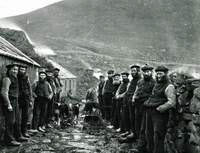On either side of a rock-
Two files of men are standing barefooted,
Bearded,
waistcoated, each with a tam-
On his head, and most with a set half-
That comes from their companionship with rock,
With soft mists, with rain, with roaring
gales,
And from a diet of solan goose and eggs,
A diet of dulse and sloke and sea-
And ignorance of what a pig, a bee, a rat,
Or rabbit look like, although they remember
The three apples brought here by a traveller
Five years ago, and have discussed them
since.
And there are several dogs doing nothing
Who seem contemptuous of my camera,
And a woman who might not believe it
If she were told of the populous mainland.
A
man sits on a bank by the door of his house,
Staring out to sea and at a small craft
Bobbing there, the little boat that brought me here,
Whose carpentry was slowly shaped
by waves,
By a history of these northern waters.
Wise men or simpletons
But in that way they almost look alike
You also see how each is individual,
Proud
of his shyness and of his small life
On this outcast of the Hebrides
With his eyes
full of weather and seabirds,
Fish, and whatever morsel he grows here.
Clear, too,
is manhood, and how each man looks
Secure in the love of a woman who
Also knows the
wisdom of the sun rising,
Of weather in the eyes like landmarks.
Fifty years before
depopulation ─
Before the boats came at their own request
To ease them from their dying babies ─
It was easy, even then, to imagine
St. Kilda return to its naked self,
Its archeology
of hazelraw
And footprints stratified beneath the lichen.
See, how simple it all
is, these toes
Playfully clutching the edge of a boulder.
It is a remote democracy,
where men,
In manacles of place, outstare a sea
That rattles back its manacles of
salt,
The moody jailer of the wild Atlantic.
Traveller, tourist with your mind set on
Romantic Staffas and materials for
Winter
conversations, if you should go there,
Landing at sunrise on its difficult shores,
On St. Kilda you will surely hear Gaelic
Spoken softly like a poetry of ghosts
By
those who never were contorted by
Hierarchies of cuisine and literacy.
You need only
look at the faces of these men
Standing there like everybody's ancestors,
This flick
of time I shuttered on a face.
Look at their sly, assuring mockery.
They are aware
of what we are up to
With our internal explorations, our
Designs of affluence and
education.
They know us so well, and are not jealous,
Whose be-
Casual husbandry upon a toehold
Of Europe, which, when failing, was not
their fault
You can see they have already prophesied
A day when survivors look across
the stern
Of a departing vessel for the last time
At their gannet-
Of the St. Kilda mouse and St. Kilda wren
As they fall into the
texts of specialists,
Ornithological visitors at the prow
Of a sullenly managed boat
from the future.
They pose for ever outside their parliament,
Looking at me, as if
they have grown from
Affection scattered across my own eyes.
And it is because of
this that I, who took
This photograph in a year of many events
The Zulu massacres, Tchaikovsky's opera ─
Return to tell you this, and that after
My many photographs of distressed cities
My portraits of successive elegants,
Of the emaciated dead, the lost empires,
Exploded
fleets, and of the writhing flesh
Of dead civilians and commercial copulations,
That
after so much of that larger franchise
It is to this island that I return.
Here I
whittle time, like a dry stick,
From sunrise to sunset, among the groans
And sighings
of a tongue I cannot speak,
Outside a parliament, looking at them,
As they, too,
must always look at me
Looking through my apparatus at them
Looking. Benevolent,
or malign? But who,
At this late stage, could tell, or think it worth it?
For I was
there, and am, and I forget.
The photograph that inspired this poem
